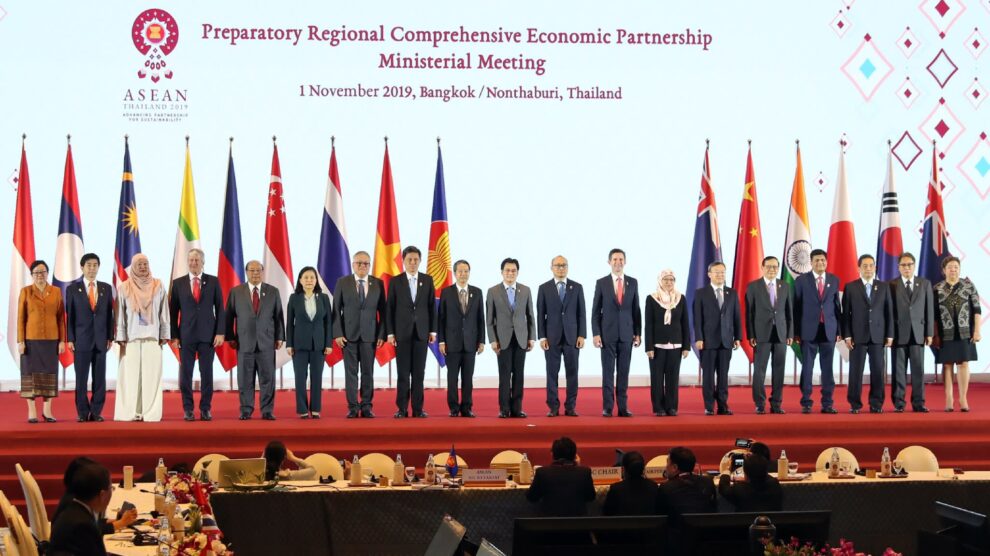RCEP Trade Deal: Modi’s government’s right decision in ‘world’s biggest trade deal’ not India: On Sunday, 15 countries in the Asia-Pacific Ocean region, including China, signed the ‘world’s largest trade treaty’ in Hanoi, Vietnam.
The countries that have joined this trade treaty are close to one-third of the global economy.
The Regional Comprehensive Economic Partnership, i.e. RCEP, has ten South-East Asia countries. Apart from these, South Korea, China, Japan, Australia and New Zealand have joined it.
The US is not involved in this trade-treaty, and China is leading it, so most economic analysts see it as ‘China’s growing influence in the region’.
This treaty is being said to be bigger than the European Union and the US-Mexico-Canada trade agreement.
Previously, the US was also involved in a trade treaty called the Trans-Pacific Partnership (TPP), but in 2017, shortly after becoming President, Donald Trump moved the US out of the treaty.
The epidemic is expected to remove the ‘sunk economies’
The deal then included 12 countries in the region that also had the support of former US President Barack Obama because they viewed the trade treaty as a ‘Chinese-dominated response’.
The negotiations on RCEP were also going on for the last eight years, which was finally signed on Sunday.
The countries involved in this treaty believe that it will help in improving the situation like the Great Depression caused by the coronavirus epidemic.
On this occasion, Vietnam’s Prime Minister Nun-Xuan-Fook described it as “the foundation of the future” and said, “Today the RCEP agreement was signed, it is a matter of pride, it is a big step that ASEAN countries are playing a central role in it.”,
And together with allied countries, they have established a new relationship that will become stronger in the future. As these countries move towards progress, it will have an impact on all countries in the region. “
RCEP Trade Deal
According to this new trade treaty, RCEP will abolish customs duties on many types of goods within the next twenty years. This would include intellectual property, telecommunications, financial services, e-commerce and business services.
However, the rules like which country a product originated in can have some effect, but in countries which are part of the treaty, there is already agreement among many countries about free-trade.
It is believed that with this trade treaty, China’s influence in the region has deepened.
India not included in RCEP
India is not a part of this treaty. India was also involved in the RCEP at the time of bargaining, but only last year India got separated from it.
The Government of India had then said that ‘this will lead to a flood of cheap Chinese goods in the country and it will be difficult for small scale manufacturing traders in India to deliver goods at that price, which will increase their troubles’.
But on Sunday, ASIAN countries who joined the treaty said that ‘the doors will be open for India, if India wants to join RCEP in future.’
But the question is, ‘How can India not be a part of this trade group?’ To understand this, BBC correspondent Faisal Mohammed Ali spoke to India-China business affairs expert Santosh Pai.
He said, “RCEP has a membership of 15 countries. About 30 percent of the world’s construction industry is owned by these countries. In such a situation, such free-trade agreements are very important for India, Because India can explore many new business opportunities through them. “
Is India Trying to reduce dependence on China?
“India is inviting many countries to come and invest in the construction industry, so they are attracted to such agreements, but if it is not in India, then it becomes a question that they should come to India How to promote it. “
“The second thing is that the buying capacity of consumers in India is increasing, but when compared internationally, it is still very low. If a foreign company has to come and manufacture in India, then also to export it Much care has to be taken because it is consumed in the domestic market of India, it seems a little difficult. “
At one time, India, along with countries like Japan and Australia, wanted to reduce ‘dependence on China’. But now those countries are involved in it, and India is different from it. What is the reason for this?
On this, Santosh Pai said, “How much India can reduce ‘dependence on China’, it will not be seen in six-seven months, but in five years it will show its full effect. Only then will know how much India has Seriously it did.
The rest of the countries have been trying to reduce their dependence on China for many years, and this is the reason that these countries do not want to stay out of the RCEP because they know that by staying inside it “Dependence on China” can better reduce. “
He said, “Apart from China, there are many strong countries in RCEP which have excellent work in many fields (eg electronic and automobile). But India’s problem is that till last year, India was trying very hard to increase the sugar trade How to increase more and attract Chinese investment more and more. “
“India had a target of $ 100 billion in terms of trade with China. But in the last six months, the situation has changed completely due to political reasons.
Now the Government of India has started a ‘self-reliant campaign’ which aims to that trade, with China be reduced and Chinese investment should also be limited. “
In the end, he said, “Even if the ‘self-reliance campaign’ was taken seriously, it would take years to get its effect. So it would be too early to say anything.”

Subscribe to Email Updates :







Add Comment